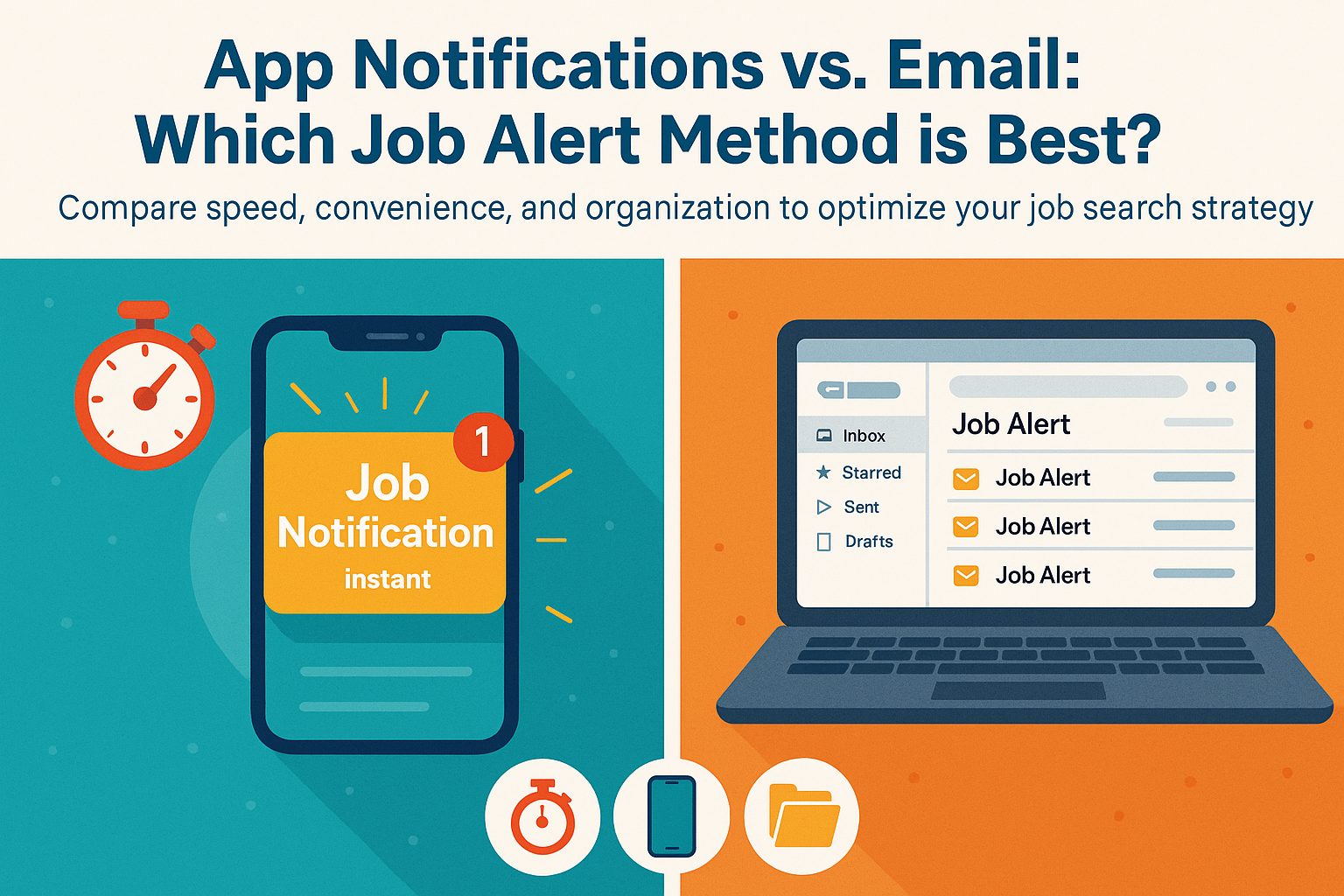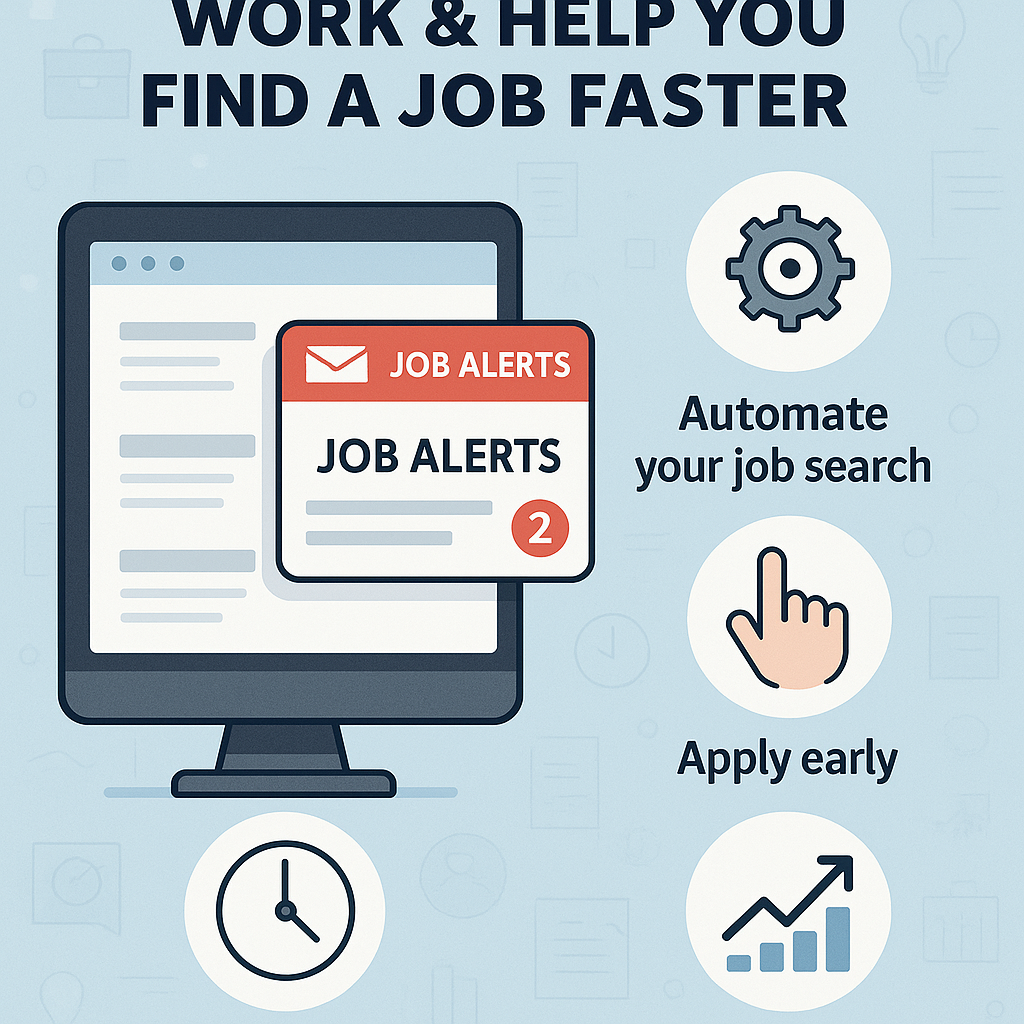How Job Alerts Work & Help You Find a Job Faster

Should you use app or email job alerts? Compare both methods for speed, convenience, and organization to build the...

Learn how job alerts work to automate your job search. Discover why using them helps you apply early, save time, and...

Learn how to use job alerts effectively to apply early, personalize your applications, and stand out in a...

Should you use email or app alerts for job updates? Compare both methods and choose the best one for your job search...

Learn the biggest mistakes job seekers make with job alerts and how to fix them for better job matches, faster...

Learn how to create targeted job alerts using the right filters so you can find better roles faster, without wasting...

Learn how job alerts work, why they save time, and how to set them up to get the right job notifications directly in...
Resources
-

Set up personalized job alerts to receive notifications about new job openings that match your...
-

Find part-time job opportunities perfect for students, parents, and professionals seeking...
-

Work from home jobs across industries with flexible hours, competitive pay, and real career...
-

Create professional resumes with easy-to-use resume builders. Choose from templates, get...
-

Kickstart your career with internships tailored for students and graduates — explore paid,...
-

Remote jobs have revolutionized how we work, giving professionals the freedom to contribute from...
-

Find the best fresher jobs and entry-level opportunities across IT, Finance, Marketing, and...

How Do Job Alerts Work and Why Should I Use Them?
The endless scroll. You open a job board, full of motivation, and start searching. Hours later, your eyes are strained, you have dozens of tabs open, and you're not sure if you’ve applied for a job or just fallen into a digital rabbit hole. Worse, you log off with the nagging fear that the perfect job was posted just minutes after you stopped looking.
This is the exhausting reality of a manual job search. The market moves at lightning speed, and the best opportunities are often filled before most people even see them. Relying on chance and constant manual effort is a recipe for frustration and burnout.
What if you could automate the search? What if you had a personal assistant working for you 24/7, scanning thousands of job postings and instantly delivering only the ones that match your exact needs?
That is precisely what a job alert does.
This guide will break down exactly what job alerts are, how they function behind the scenes, and why they are the single most important tool for a faster, smarter, and less stressful job search.
What Exactly Is a Job Alert?
At its core, a job alert is an automated notification service offered by job search platforms. You tell the platform what kind of job you are looking for by setting specific criteria—such as job title, location, and experience level.
The platform's system then constantly scans every new job that gets posted. When a new listing matches your criteria, it automatically sends you a notification via email or a mobile app.
Think of it this way: instead of you having to go out and find the jobs, a job alert brings the right jobs directly to you. It transforms your job search from a proactive, time-consuming hunt into a reactive, efficient process.
How Job Alerts Work: The Simple 3-Step Process
The technology behind job alerts is sophisticated, but from a user's perspective, it is incredibly simple and works in three logical steps:
-
You Define Your Search Criteria: You act as the manager, giving specific instructions. You enter keywords for the job title you want (e.g., “Graphic Designer Intern,” “Remote Data Analyst”), and then use filters to add non-negotiables like location, experience level (“Fresher”), and industry. The more specific your instructions, the better the results.
-
The Platform Scans for Matches: Once you save your alert, the platform’s algorithm gets to work. It continuously compares the details of every new job posting against your saved criteria. It’s a tireless digital assistant that never misses a new listing.
-
You Get Notified Instantly: As soon as a match is found, the system triggers a notification. This can be an instant push notification to your phone or a consolidated email digest sent to your inbox daily. This final step is what gives you the critical advantage of speed.
The 5 Biggest Reasons You Should Be Using Job Alerts
If you're still on the fence, here are the five most powerful advantages that job alerts provide, transforming your job search from a chore into a strategy.
1. You Save an Incredible Amount of Time
The average job seeker can spend upwards of 10-15 hours per week just looking for relevant job openings. A job alert system cuts that time down by over 90%. Instead of spending hours scrolling, you spend just a few minutes reviewing a pre-qualified list of opportunities. This frees up your time and mental energy to focus on what really matters: crafting perfect applications.
2. You Are Among the First to Apply
As we know, timing is everything. Recruiters are often flooded with hundreds of applications within the first 48 hours. By getting an instant notification, you can apply within hours—or even minutes—of a job going live. This places your resume at the top of the pile, dramatically increasing the odds that a hiring manager will see it.
3. You Discover Jobs You Might Have Missed
A manual search is limited by the keywords you think of at that moment. An automated alert system works continuously, often uncovering hidden gems you wouldn't have found otherwise. It might be a role with a slightly different title or a job at a new company you hadn't heard of. Platforms like JobPe use smart matching to suggest relevant roles based on your profile, widening your net to catch more opportunities.
4. You Stay Informed About the Job Market
Even if you aren't applying every day, your daily job alert email is a valuable source of market intelligence. By quickly scanning the alerts, you’ll start to notice key patterns: - Which companies are hiring the most? - What specific skills are repeatedly mentioned in job descriptions? - What are the typical salary ranges for your desired roles?
This information helps you understand what employers want so you can tailor your resume and skills accordingly.
5. You Reduce Job Search Stress and Burnout
The feeling of "fear of missing out" (FOMO) is a major source of stress for job seekers. It pushes you to be constantly online, always searching. Job alerts eliminate this anxiety. You can relax, knowing that a system is in place to catch any relevant opportunities. This transforms the job search from a chaotic, stressful activity into a structured, manageable part of your day.
How to Set Up Your First Job Alert on JobPe
Creating your first alert is simple and takes less than two minutes. Using a platform designed for clarity, like JobPe, makes it even easier.
- Navigate to the Job Search Page: Start by entering your main keyword or job title into the search bar (e.g., “Sales Fresher”).
- Apply Your Filters: Use the filters to add essential criteria. The most important ones are Location (e.g., “Kolkata” or “Remote”) and Experience Level (“Entry-Level” or “Fresher”).
- Click to Create the Alert: Once your search results look relevant, click the "Create Job Alert" button, which is usually found at the top of the search results.
- Choose Your Frequency: You will be prompted to choose how often you want to receive notifications. A Daily summary is perfect to start with.
- Confirm, and You're Done! Your automated job search assistant is now active.
Pro Tip: Start with Both Broad and Narrow Alerts
If you’re just starting out, a great strategy is to create two different types of alerts to cover all your bases:
- One Broad Alert: Use a general keyword like “Marketing” or “Internship” for your city. This will give you a wide-angle view of the market and help you discover different types of roles available.
- One Narrow Alert: Create a hyper-specific alert like “Entry-Level Social Media Manager” with an industry filter. This will deliver only high-quality, perfectly matched roles that you can act on immediately.
Over time, you can delete the broad alert and create more specific ones as you refine what you are looking for.
Final Word: Make Your Job Search Work for You
Stop letting the job search control your day. By setting up job alerts, you put an automated system in place that works for you, saving you time, reducing stress, and giving you the critical speed advantage you need to get noticed.
It is the first and most fundamental step in building a modern, strategic job search.
Once your alerts start bringing you the right opportunities, you need to be ready to act. Create a standout resume with the JobPe Resume Builder and prepare to ace the next stage with helpful interview prep guides. Take control of your job search today by letting the opportunities come to you.
